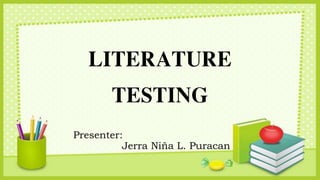
Literature Testing
- 1. LITERATURE TESTING Presenter: Jerra Niña L. Puracan
- 2. • Literature testing aims to institutionalize certain concepts and facts which are part of the literary learning and to direct attention to the relatively more important literary skill (Tenbrink, 1998). • Stern (1987) in her article, “Expanded Dimensions to Literature in ESL/EFL: An Integrated Approach,” stressed the great influence of literature to language learning. Rationale of Literature Testing
- 3. Why should we test literature? to develop literary competence to bring a literary piece of art to students' intellectual and emotional baggages to develop decision-making and meaning-making
- 4. Formats of Literature Tests The format of literature tests addresses specific language skills. It may be oral or written. • Oral literature tests challenge the speaking and listening skills of the students. • Written tests demand skills in reading and writing.
- 5. Common Types of Literature Tests Multiple Choice True or False Gap-Filling Essay Test Knowledge Question Oral Test
- 6. Testing literature has been influenced by theories of reading, literary theories and criticism, and teaching styles. Questions fall into two main categories: questions that do not require contact with the text questions that do require contact with the text Literature tests are categorized into two: tests of literary information tests of literary interpretation
- 7. • According to the Taxonomy of Cognitive Questions, questioned are classified, according to complexity, as follows: 1. literal comprehension 2. reorganization 3. inferential comprehension 4. evaluation 5. appreciation
- 9. 1. Testing Literal Comprehension - includes recall of details, main ideas, sequence, comparisons, cause and effect relationships and character traits a. Objective Type • Recall of details: Identify the characters who said the following lines in the story. • Sequence: Rearrange the order of events below as they happened in the story.
- 10. b. Essay Type • Comparisons: What are the contrasting characteristics of the protagonist and the antagonist as described by the author? • Character traits: Cite incidents in the story that show the strained relationship between the couple.
- 11. 2. Testing Reorganization - entails classifying, outlining, summarizing, and synthesizing ideas a. Objective Type • Classifying: Select the item that does not belong to the group. • Synthesizing: From the choices given, select the statement that expresses the theme of each of the following selections.
- 12. b. Essay Type • Outlining: Construct a topic outline of the essay providing at least three main heads and a number of sub-heads. • Summarizing: Write a one-paragraph summary of the plot of the story.
- 13. 3. Testing Inference - Inferential tests require students to use information explicitly stated in the text along with personal experience and knowledge in order to conjecture and to form hypothesis.Tests include: • inferring supporting details • main idea • sequence • comparisons • cause-and-effect relationships • character traits • author's organization • predicting outcomes • interpreting figurative language
- 14. a. Objective Type • Interpreting figurative language: Choose the best interpretations of the following figurative lines within the context of the poem. • Inferring character traits: Match the adjectives that best describe the traits of the character as shown by his/her actions. b. Essay Type • Predicting outcomes: What do you think is in store for Lumnay as the symbols at the end of the story portend? • Inferring author's organization: Why did Nick Joaquin use three generations in his story?
- 15. 4. Testing Evaluation - Evaluation tests require students to compare information and ideas in a text with material presented by the instructor or other authorities and with the student's own knowledge and experience in order to form judgements of various kinds. Tests include judgements of: • reality and fantasy • fact or opinion • adequacy and validity • appropriateness • worth • desirability • acceptability
- 16. a. Objective Type • Judgment of fact or opinion: Write O if the following statement expresses an opinion of a reader on the story, F is the statement is stated by the author in the story. b. Essay Type • Judgments of reality and fantasy: Do the events in the story depict real-life situations or are they just product of the author's imagination? Explain. • Judgment of acceptability: Are the actions of the hero acceptable from the moral point of view? Why or why not?
- 17. 5. Testing Appreciation - Appreciation tests require students to articulate emotional and aesthetic responses to the text based on personal and professional standards of literary forms, styles, genres, theories, critical approaches. Tests include: • giving emotional response to the text • identifying with characters or incidents • reacting to author's or speaker's connotative and denovative use of language • reacting to imagery
- 18. a. Objective Type • Reacting to author's connotative use of language: Select the best connotative meaning of the underlined word in each statement lifted from the story. b. Essay Type • Identifying with character or incidents: Which character in the story can you identify most? What are your similarities? • Responding emotionally to the text: How do you feel towards Hamlet? Do you symphatize with him? Why or why not?
- 19. Evaluating Literature Tests Objective Type • easy to evaluate because there are ready answer keys to the questions. Essay Type • difficult to assess because the evaluation focuses on both content (substance of the response) and form (language of the response).
- 20. Literal Comprehension & Inference Test Evaluation and Appreciation Tests • Content should be assigned more weight than form. • Assessment should be based on its consistency with the literary text. • Assessment should consider grammar and diction. • Depends on the student's ability to expound his/her ideas; the more proficient in language the student is, the more chances he/she has of getting good ratings.
- 21. THANK YOU!
